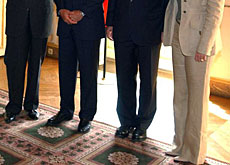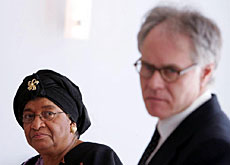Women stumble on path to the top

International Women's Day is this year focusing on women's equal participation in decision-making – an issue which has strong resonance in Switzerland.
Although some progress has been made, women are still struggling to break through the glass ceiling in politics and business.
United Nations Secretary-General Kofi Annan said there were now 11 women heads of state or government worldwide and three countries, Chile, Spain and Sweden, had gender parity in government. But the overall rate of progress was slow.
One of the new women heads of state is Liberian President Ellen Johnson-Sirleaf who was in the capital, Bern, for an official visit on Tuesday.
Africa’s first woman president said that the role of women in decision-making had been improving over the years and that her own election was a prime example of that.
“I believe that within a decade you’ll see several women presidents all over the world including Africa,” she told swissinfo. “That said, there’s still a long way to go.”
Swiss progress
In Switzerland women have made progress in the federal parliament, making up about 25 per cent of parliamentarians.
But in a recent worldwide ranking of female representation in parliament, Switzerland came in 27th, behind Burundi and Afghanistan.
“In international comparison, we are in the lower first third of parliamentary representation, but when you look at the business community, we are even lower,” Patricia Schulz, head of the Federal Office for Gender Equality, told swissinfo.
“The 26 firms on the Swiss stock exchange have three per cent women among their top managers, and nine per cent on their board of directors.”
For management, the proportion of women had gone from 19 per cent in 1991 to 30 per cent last year.
Schulz said one reason for the discrepancy could be that women got the vote fairly late – 1971 – and that efforts were made in politics to make up for lost time. There hadn’t been the same imperative for top management and the boardrooms, she said.
Highly-qualified
Schulz said Switzerland needs to train more highly qualified women, such as engineers and economists. Those already in these positions should be allowed access to top jobs.
Programmes to encourage equal opportunities at work, including quotas, are a useful tool, said Schulz.
Foreign Minister Micheline Calmy-Rey – the only woman in the seven-member cabinet – caused a stir last month when she insisted on an equal number of male and female diplomatic recruits.
Schulz said affirmative action is accepted in Switzerland and that these measures have already born fruit in the scientific and university sectors. But more needs to be done.
Another area where women are being held back is the difficulty of combining family with a career.
Schulz said action is needed on various levels, from thinking about roles within a couple, to allowing both parents to work flexibly. This is the responsibility of companies, the government and local authorities, she added.
swissinfo, Isobel Leybold-Johnson
To mark Women’s day in Switzerland, Amnesty International has launched a campaign against domestic violence.
The Swiss Lenten Fund charity is holding a symposium on women’s rights in the developing world. Unicef Switzerland is campaigning against genital mutilation.
Other events include union calls for equal pay for women, as women in general earn 25% less than men in Switzerland.
Women’s share of management jobs worldwide is 20-40%.
Several Scandinavian countries have implemented quotas to increase the number of women on company boards to 40%.
Women’s participation in parliaments averages at 16.3 per cent (25% in Switzerland).
Women make up 20% of Swiss diplomatic staff, but there are only 10 women ambassadors.

In compliance with the JTI standards
More: SWI swissinfo.ch certified by the Journalism Trust Initiative












You can find an overview of ongoing debates with our journalists here . Please join us!
If you want to start a conversation about a topic raised in this article or want to report factual errors, email us at english@swissinfo.ch.